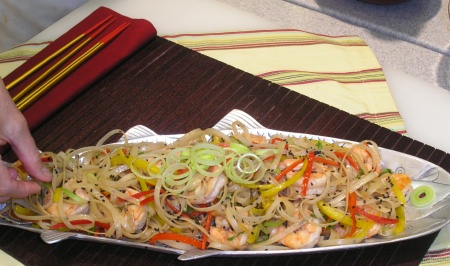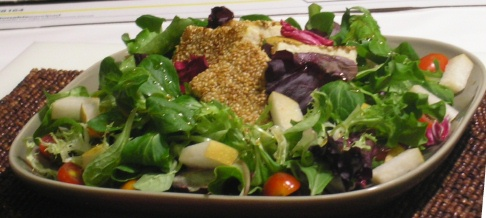On Becoming a Hungry Ghost
In Chinese folklore, hungry ghosts devour everything they can find and are never satisfied. We may scoff at their appalling lack of self control. Yet if we look around, how many of us have become entwined in the same fate?
In the story “Tofu with Chili-Garlic Sauce” from A Banquet for Hungry Ghosts, the antagonist, Dr. Zhou, surrounds himself with material goods: an expensive car, a luxury apartment, and the latest electronic gadgets. He constantly strives to make more money even though it entails the abuse of his position as a doctor by ruthlessly exploiting the families of his mental patients and disregarding his medical ethics. Like a hungry ghost, he consumes indiscriminately, and remains unfulfilled and unsatisfied as he devours his way through life.
The modern lifestyle, which emphasizes the acquisition of material goods, makes it frighteningly easy to forsake what is important in life. Instead we fall victim to a perpetuating cycle of thoughtless consumerism.
When I was a young girl, I had very simple dreams, like owning a red dress and eating a large box of chocolates all by myself, or enjoying a whole apple that I wouldn’t have to share with my brothers, who would always take too big of a bite. Small things, like finding two forgotten peanuts in my pocket, or a classmate offering me a small ginger candy, could bring me tremendous joy.
Those memories seem so distant—yet they shaped my attitude towards life—conscious eating and simple living. I abhor the concept of being a slave to material goods. Or perhaps a cynic could say I just lack the motivation to become one. I would rather spend my weekend reading and writing, cooking and eating, or feeding my “addiction” to playing badminton, than running from one store to another.
In the story “Tofu with Chili-Garlic Sauce” from A Banquet for Hungry Ghosts, the antagonist, Dr. Zhou, surrounds himself with material goods: an expensive car, a luxury apartment, and the latest electronic gadgets. He constantly strives to make more money even though it entails the abuse of his position as a doctor by ruthlessly exploiting the families of his mental patients and disregarding his medical ethics. Like a hungry ghost, he consumes indiscriminately, and remains unfulfilled and unsatisfied as he devours his way through life.
The modern lifestyle, which emphasizes the acquisition of material goods, makes it frighteningly easy to forsake what is important in life. Instead we fall victim to a perpetuating cycle of thoughtless consumerism.
When I was a young girl, I had very simple dreams, like owning a red dress and eating a large box of chocolates all by myself, or enjoying a whole apple that I wouldn’t have to share with my brothers, who would always take too big of a bite. Small things, like finding two forgotten peanuts in my pocket, or a classmate offering me a small ginger candy, could bring me tremendous joy.
Those memories seem so distant—yet they shaped my attitude towards life—conscious eating and simple living. I abhor the concept of being a slave to material goods. Or perhaps a cynic could say I just lack the motivation to become one. I would rather spend my weekend reading and writing, cooking and eating, or feeding my “addiction” to playing badminton, than running from one store to another.

Or at least this was the case until I decided to remodel my kitchen.
Food and cooking are very important parts of my life and career. This is reflected in Banquet; not only does every story lead to a recipe, but many are staged around a kitchen. After my novel, Revolution is not a Dinner Party, came out, journalists often wanted their photographers to take photo shoots in my modest kitchen for their feature stories. I began to turn down these requests after one photographer asked me to pose in my more photogenic flower garden instead.
Food and cooking are very important parts of my life and career. This is reflected in Banquet; not only does every story lead to a recipe, but many are staged around a kitchen. After my novel, Revolution is not a Dinner Party, came out, journalists often wanted their photographers to take photo shoots in my modest kitchen for their feature stories. I began to turn down these requests after one photographer asked me to pose in my more photogenic flower garden instead.

I dreamed of enlarging my kitchen, making it more functional, and modernizing its appearance. This summer, I finally mustered the courage to take the first steps: selecting materials and interviewing contractors. For months I have visited showrooms and stores, researched online and talked to contractors. I’ve amassed quite a collection of drawings and catalogs. Just the selection of different faucets was daunting. My mind was stuffed to bursting with particulars about formaldehyde emissions, radiation from granite and VOC-free paints.
And yet I felt unfulfilled and unsatisfied. The notion that once I made a decision, I’d have to live with it for years, while a better option might be at the next store or on the next web page, locked me in a shopping frenzy. I kept trying to find ways to add more stuff to a kitchen that wasn’t getting much bigger. By the end of each day, I was exhausted. Yet the next morning, I went out to hunt for more! I pictured myself becoming a hungry ghost, rummaging through cabinets, countertops, flooring, appliances, plumbing and light fixtures without end.
Worst of all, I couldn’t write. My mind was overwhelmed by thoughts of remodeling.
I am finally understanding why people spend months and years researching and working on remodeling their homes. When I walk into a remodeled kitchen that is thoughtfully designed, with beautiful cabinets and tastefully coordinated counters and walls, I am no longer just impressed. I am swept up by a wave of deep respect and awe. For now I know someone who has spent countless hours researching, shopping, and dealing with contractors. Most importantly, these people had the strength and self-discipline to stop shopping and make decisions.
One day, as I stood in the middle of a big showroom, I wondered, given the time I had spent on this project, how many books could I have written, interesting blogs could I have read, delicious meals could I have cooked, or badminton games could I have won?
How I wish remodeling a kitchen was as simple as owning a red dress, eating a whole box of chocolates, or not sharing an apple! In the meantime, I continue to cook dishes like the one below in my someday-to-be-remodeled kitchen.
You can find these and more healthy and delicious recipes in my cookbook, Cooking with Green Tea.
And yet I felt unfulfilled and unsatisfied. The notion that once I made a decision, I’d have to live with it for years, while a better option might be at the next store or on the next web page, locked me in a shopping frenzy. I kept trying to find ways to add more stuff to a kitchen that wasn’t getting much bigger. By the end of each day, I was exhausted. Yet the next morning, I went out to hunt for more! I pictured myself becoming a hungry ghost, rummaging through cabinets, countertops, flooring, appliances, plumbing and light fixtures without end.
Worst of all, I couldn’t write. My mind was overwhelmed by thoughts of remodeling.
I am finally understanding why people spend months and years researching and working on remodeling their homes. When I walk into a remodeled kitchen that is thoughtfully designed, with beautiful cabinets and tastefully coordinated counters and walls, I am no longer just impressed. I am swept up by a wave of deep respect and awe. For now I know someone who has spent countless hours researching, shopping, and dealing with contractors. Most importantly, these people had the strength and self-discipline to stop shopping and make decisions.
One day, as I stood in the middle of a big showroom, I wondered, given the time I had spent on this project, how many books could I have written, interesting blogs could I have read, delicious meals could I have cooked, or badminton games could I have won?
How I wish remodeling a kitchen was as simple as owning a red dress, eating a whole box of chocolates, or not sharing an apple! In the meantime, I continue to cook dishes like the one below in my someday-to-be-remodeled kitchen.
You can find these and more healthy and delicious recipes in my cookbook, Cooking with Green Tea.
Ying writes ghost stories, novels, cookbooks, picture books, and hosts cooking shows. Her novel Revolution is not a Dinner Party has received twenty-eight awards, including the ALA Best Books and Notable Books. Ying has visited schools throughout the US and abroad, sharing with students her journey as a writer, how her life in Chine inspired her writing, and the challenges of writing in her second language. She has lectured on a variety of subjects at writer's conferences and universities, and aboard cruise ships. Ying is available to talk about her books to book clubs in person, by telephone, or online, and she was recently interviewed in the San Francisco Chronicle. Ying was born and raised in Wuhan, China.









